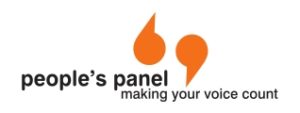The July 2022 People’s Panel survey asked about:
- Financial Stability Tracker
- Waste Collection Services
- Household Recycling Centres
- Waste Collection Issues and Problems
- Maintenance and Cleanliness
- Local Priorities

1,043 local people completed this survey, meaning results for Hull are reported with a confidence interval of 3.03% at a 95% confidence level (e.g. we are 95% certain that the actual result falls within +/-3.03 percentage points of the reported figure).
An infographic summary of the results can be found here: July 2022 Infographic
A more detailed analysis report can be found here: July 2022 Report
Financial Stability Tracker
| Indicator | March 2022 | May 2022 | July 2022 |
| Keeping up with bills / credit commitments without any difficulties | 45% | 43% | 42% |
| Keeping up with bills / credit commitments, but it is a struggle from time to time | 33% | 37% | 32% |
| Keeping up with bills / credit commitments, but it is a constant struggle | 10% | 10% | 13% |
| Falling behind with some bills / credit commitments | 3% | 3% | 4% |
| Having real financial problems, have fallen behind with many bills / credit commitments | 3% | 2% | 1% |
| Don’t have any bills / credit commitments | 2% | 1% | 1% |
According to our latest survey (July 2022):
• The majority of respondents (74%) are either keeping up without any difficulties (42%) or only struggling occasionally (32%).
• 18% find it a constant struggle to keep up (13%), are falling behind financially (4%) or are having real financial problems (1%).
• Compared to March 2022, there has been 4 percentage point shift away from those who are financially managing towards those who are seriously struggling.
• This is in large part due to a significant increase (+3 percentage points) in those respondents who keeping up with bills / credit commitments but finding it a constant struggle
Analysis now suggests that those who are struggling the most financially include, in order,:
• Group B: Economically Inactive Singles in Public Rented Flats
• Group A: Pensioners in Small Public Rented Flats
• Residents from BAME backgrounds
• Group E: Low Income Residents in High Density Non-Council Terraced Houses
• Group C: Young Families with Dependent Children in Public Rented Houses in High Deprivation
• Group D: Low Income Families on Established “Council Estates”
• Residents with an illness or impairment
• Young people (aged 16 – 34)
Waste and Street Scene Services
Waste Collection Services
-
The significant majority of respondents are satisfied or very satisfied with:
- Their waste service overall (86%)
- Their black bin service overall (87%)
- Their blue bin service overall (89%)
- Their brown bin / food bin service overall (89%)
Since 2018, there has been a significant increase in satisfaction with the waste service overall (+7 percentage points) but a significant decrease in satisfaction with the brown bin / food bin service overall (-6 percentage points).
Household Recycling Centres
- Three quarters of respondents (75%) have used a household waste recycling centre in the last two years.
- The significant majority of users are satisfied or very satisfied with household waste recycling centres overall (91%).
- Compared to when the same question was asked in 2021, there has been a significant increase in satisfaction with household waste recycling centres overall amongst users (+15 percentage points).
Waste Collection Problems and Issues
- 62% of respondents have experienced at least one of the waste collection problems or issues listed in the survey in the last two years.
- This is a significant decrease compared to when the question was asked in 2020 (-13 percentage points).
- The most common problems experienced in the last two years are respondents bins not being returned to their proper place (30%) and respondents not being provided with new liners when requested (23%)
- This is followed by missed black bin collections (19%) and missed blue bin collections (16%).
- Just under a third of respondents (31%) have contacted the council in the last two years to make a complaint or enquiry about the waste collection service or bins.
- Satisfaction amongst those who have tends to be low, especially when it comes to the ease of contacting the council (35%) and the ease of getting through to the council (31%)
Maintenance and Cleanliness
- Less than 40% of respondents are satisfied or very satisfied with any of the aspects of street cleanliness listed in the survey.
- In particular, a significantly low percentage of respondents are satisfied or very satisfied with the cleanliness of Hull overall (25%) and the frequency of street cleaning (25%).
- However, since this question was last asked in 2020, there has been a significant increase in respondents satisfaction with the cleanliness of their local area (+8 percentage points).
Local Priorities
- Over half of respondents (58%) believe that litter is a big problem in their local area.
- This is followed by half (50%) who believe that fly-tipping is a big problem in their local area.
- A third of respondents (35%) have contacted the council in the last two years about a problem with the cleanliness / maintenance of their local area
- The most reported problems are fly-tipping (21%), litter (13%), litter bin emptying (10%) and litter bin maintenance / condition (9%).
- There is a significant difference between the proportion of people who perceive these to be big issues in their local area and the proportions who actually report a problem with them.
- Satisfaction amongst those who have reported a problem tends to be low, and since this question was last asked in 2018, there has been a significant decrease in respondents satisfaction with the ease of contacting the council (-14 percentage points) and the helpfulness of staff (-13 percentage points).
